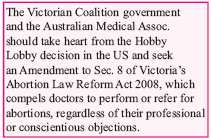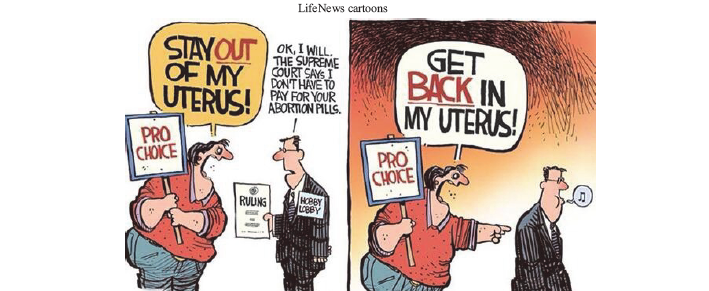Hobby Lobby Decision Hysteria
["hysteria" - Latin and Greek "of the womb"]
There was a time not so long ago in the 19th century when female hysteria was a common medical diagnosis: women considered to be suffering from it exhibited a wide array of symptoms, including faintness, nervousness, sexual desire, insomnia, fluid retention, heaviness in the abdomen, muscle spasm, shortness of breath, irritability, and "a tendency to cause trouble".


The history of the notion of hysteria can be traced to ancient times; in Greece it was described in the gynecological treatises of the Hippocratic Corpus, which date from the 5th century BC. Plato's dialogue Timaeus compares a woman's uterus to a living creature that wanders through a woman's body, "blocking passages, obstructing breathing, and causing disease." The concept of a sick, wandering womb was later viewed as the source of the term hysteria, which stems from the Greek cognate of uterus, hystera.
While we have abandoned those medical diagnoses of "hysteria", nevertheless those ancient descriptions of someone "hysterical" match the reactions of pro-abortion women in the US to the US Supreme Court's 5 - 4 decision that Hobby Lobby (an arts and crafts company) on the grounds of religious objection, can opt out of the Obamacare mandate to fund abortifacient "contraceptives". Hobby Lobby does not object to all contraceptives, but only the abortion inducing ones like the Morning After Pill.
The US Supreme Court ruling is only a limited victory for religious freedom, but even so pro-choice women have reacted in a - well - hysterical way, calling for Hobby Lobby to be burned to the ground. As Matt Walsh wrote in LifeNews, this "marks the first time in history that anyone has made terrorist threats against an arts and crafts chain".
Matt Walsh adds: "The Huffington Post screeched in its headline that the Supreme Court has 'gone after women', while legions of other liberals threw hysterical temper tantrums over Hobby Lobby's 'intrusion into a woman's uterus'.
Mother Jones decided that the Supremes hadn't only waged a war against women but against science as well."Justice Gibsberg's dissent was illogical, if not hysterical, to say the least: "[The Hobby Lobby decision will] deny legions of women, who do not hold their employers' beliefs, access to contraceptive coverage". What? Didn't women access contraceptives in the millenia before Obamacare? The issue in the Burwell v Hobby Lobby case was not that women were denied access to abortifacient contraceptives but that Hobby Lobby should not be compelled to pay for these pregnancy-terminating drugs.
Whether an employers' health insurance plan covers birth control or not, no one is trying to stop women from accessing it. Matt Walsh writes: "The issue here is whether a private company should be forced to pay for birth control, not whether it should be allowed to sneak into your house at night and check to make sure you don't have a bottle of Yaz in your medicine cabinet. If your boss is in your bedroom, call the police. Or stop inviting him in. When you ask him to pay for what you do in the bedroom, you are inviting him in. Want him out? Good. Then stop making your birth control into a national headline. Deal with it yourself, privately".
The hysteria following the Hobby Lobby decision reminded me of Sandra Fluke complaining that her birth control cost her $3,000 a year and that Georgetown University did not cover this in its student health plans. Sandra Fluke's pills must have been platinum coated - on many university campuses condoms are distributed free - multicoloured too - and Planned Parenthood hands out birth control pills free. Are these whingeing feminists for real or just hysterical?

